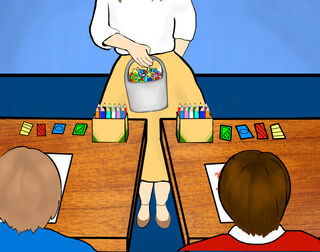Cognition
Do Children Learn Moral Lessons from Storybooks?
Changing children’s minds about moral issues requires straightforward lessons.
Posted October 10, 2020 Reviewed by Gary Drevitch

Many bestselling children’s storybooks, like The Lorax, aim to teach kids important moral lessons. But do they work? New research suggests that they probably don’t, but that parents can effectively instill moral ideas in other ways.
School-aged children have clear preferences for how to fairly divide resources. Some kids think that it’s better to give everybody the same amount, no matter what. Others think that harder-working people deserve more. In our politically divided world, these beliefs have far-reaching implications.
Can adults influence this fundamental variation in what children think is fair? And if so, what is the most effective way to do this? In a paper published today in the journal Cognition, my collaborators and I present some answers to these questions by reporting on the differential effectiveness of a series of experimental interventions conducted with 248 children between the ages of 6 and 8.
We first measured the influence of storybooks that preached the moral superiority of either equality or merit. Alongside rich illustrations, we presented children with tales about a society of beavers who had to figure out how to divide wood for building dams. Children who initially indicated that they favored merit were read books that advocated for equal distributions, while children who initially favored equality were read books that advocated for merit. To our surprise, none of these stories had any effect on children’s preferences for how to divide resources, suggesting that many classic children’s books are also unlikely to change children’s moral beliefs.

Storybooks weren’t uniformly ineffective, however. We also tested the power of stories in which the protagonists were children rather than beavers and the resources being distributed were prizes rather than wood. Here, because children could easily relate the lessons to their real lives, they readily learned and applied the moral lessons that were conveyed — especially when the stories taught that equality was the ideal form of resource distribution.
In comparing these two studies, it is clear that only some stories can teach moral lessons. Stories are efficacious when they are directly applicable to the context that a child is dealing with, and not when they constitute fanciful tales about talking animals.
How does the power of stories stand up to direct instruction? In a separate study that we report in our paper, an experimenter told children what she thought was the right way to distribute resources, rather than reading a storybook. In this case, the majority of our participants distributed resources to other children in accordance with what this experimenter had preached, rather than dividing resources in the way they initially thought was fair.
When we directly compared the effectiveness of a storybook and a firsthand testimonial that were very closely matched in content (each involved an art teacher deciding how to reward her students), we found that children were equally influenced by both formats. This means that, even though storybooks can be effective when they are situated within a real-world context, they still aren’t any more effective than hearing an adult directly express their values.

In our final study, we also retested participants’ preferences after a three-week delay. Incredibly, the changes that we saw during the brief experimental session stuck: In fact, they became slightly more pronounced. This indicates that social communication from adults can lead to lasting changes in children’s preexisting moral beliefs.
Overall, our research has shown that children’s fairness preferences can be powerfully affected by social forces. However, children must be able to easily understand how a particular moral lesson is relevant to their lives; abstract or metaphorical lessons won’t do the trick.
Adults hold great responsibility in helping to instill productive values in children. Telling kids what you believe to be right or wrong may lead to long-lasting changes in their own preferences. Reading them realistic, relatable stories might have a similar effect. But allegorical stories about far-away kingdoms or virtuous bears should be reserved for their entertainment value.
References
Rottman, J., Zizik, V., Minard, K., Young, L., Blake, P. R., & Kelemen, D. (2020). The moral, or the story? Changing children’s distributive justice preferences through social communication. Cognition, 205, 104441. doi:10.1016/j.cognition.2020.104441


